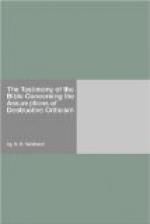To the Jews at Rome “he expounded and testified the kingdom of God, persuading them concerning Jesus, both out of the laws of Moses and out of the prophets.” (Acts xxviii. 23.)
In his Epistle to the Roman Christians he says (quoting from Lev. xviii. 5): “For Moses writeth that the man that doeth the righteousness which is of the law shall live thereby.” (Rom. x. 5, R.V.)
To the Corinthian Christians he says: “It is written in the law of Moses. Thou shalt not muzzle the mouth of the ox when he treadeth out the corn.” (1 Cor. ix. 9.) Here again he quotes from Deut. xxv. 4, and repeats the quotation in 1 Tim. v. 18. But the critics deny that it was written until after the exile, at least nine hundred or one thousand years later.
The Apostle James adds his testimony to that of Paul, while addressing the assembly of the apostles at Jerusalem, saying: “For Moses of old time hath in every city them that preach him, being read in the synagogues every Sabbath.” (Acts xv. 21.)
We have learned in these quotations from Matthew, Luke, John, Stephen, Peter, and Paul, their repeated testimony, their unvarying faith that Moses both spoke and wrote the scriptures contained in the Pentateuch. We have seen that their faith was founded on twenty-four inspired declarations that these five books were given “by the hand of Moses.” These statements are found in the books themselves, from Leviticus to the Psalms. If inspired testimony is worth anything, the case is closed, and the critics’ case goes out of court, more than disproved.
WAS CHRIST MISTAKEN?
The reader will be interested to know what Christ has to say of the critics’ denial of the Mosaic authorship of the Pentateuch. For he who “spake as never man spake,” he of whom the Father said, “This is my beloved Son, in whom I am well pleased, hear ye him,” this same Jesus had some very positive opinions on the subject before us. He has spoken clearly and definitely. We may not turn away from his testimony.
1. After healing the leper, our Lord said to him: “Go thy way, show thyself to the priest, and offer the gift that Moses commanded for a testimony unto them.” (See Matt. viii. 4, Mark i. 44, Luke v. 14.)
Our Savior here quotes from Lev. xiv. 2-8. Moses had been commanded to write the words that God had given him. (Exod. xxxiv. 27.) “And Moses wrote all the words of the Lord” (Exod. xxiv. 4), hence our Lord quotes the passage in Leviticus from Moses.
2. The Pharisees, always captious and controversial, sought to entangle the Savior in a discussion on the subject of divorce. Replying, “He saith unto them, Moses, because of the hardness of your hearts, suffered you to put away your wives.” (Matt. xix. 8.) Our Lord here quotes from the Mosaic law (Deut. xxiv. I-4), recognizing Moses as the author of the same.




